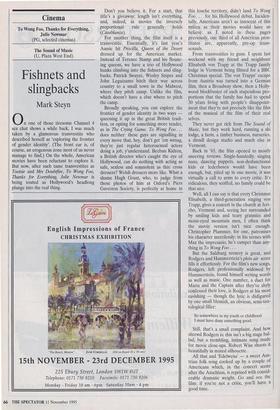Cinema
To Wong Foo, Thanks for Everything, Julie Newmar (PG, selected cinemas) The Sound of Music (U, Plaza West End)
Fishnets and slingbacks
Mark Steyn
On one of those tiresome Channel 4 sex chat shows a while back, I was much taken by a glamorous transvestite who described herself as 'exploring the frontier of gender identity'. (The front ear is, of course, an erogenous zone most of us never manage to find.) On the whole, American movies have been reluctant to explore it. But now, after such tame transvestites as Tootsie and Mrs Doubtfire, To Wong Foo, Thanks for Everything, Julie Newmar is being touted as Hollywood's headlong plunge into the real thing. Don't you believe it. For a start, that title's a giveaway: length isn't everything, and, indeed, in movies the inversely proportional rule generally holds (Casablanca).
For another thing, the film itself is a transvestite. Essentially, it's last year's Aussie hit Priscilla, Queen of the Desert dressed up for the American market. Instead of Terence Stamp and his flounc- ing queens, we have a trio of Hollywood hunks climbing into the fishnets and sling- backs. Patrick Swayze, Wesley Snipes and John Leguizamo bitch their way across country to a small town in the Midwest, where they pitch camp. Unlike the film, which doesn't have a clue where to pitch the camp.
Broadly speaking, you can explore the frontier of gender identity in two ways queening it up in the great British tradi- tion, or opting for something more tender, as in The Crying Game. To Wong Foo . . does neither: these guys are signalling in every move that, hey, don't get 'em wrong, they're just regular heterosexual actors doing a job, y'understand. Beeban Kidron, a British director who's caught the eye of Hollywood, can do nothing with acting as safe, sexless and somnolent as this: cross dressers? Welsh dressers more like. What a shame Hugh Grant, who, to judge from those photos of him at Oxford's Piers Gaveston Society, is perfectly at home in this louche territory, didn't land To Wong Foo . for his Hollywood debut. Inciden- tally, Americans aren't as innocent of this milieu as their movies would have us believe: as I noted in these pages previously, one third of all American pros- titutes are, apparently, pre-op trans- sexuals.
From transvestites to guns. I spent last weekend with my friend and neighbour Elisabeth von Trapp at the Trapp family lodge in Vermont being filmed for a BBC Christmas special. The von Trapps' escape from Austria was turned into a German film, then a Broadway show, then a Holly- wood blockbuster of such stupendous pro- portions that the family has had to spend 30 years living with people's disappoint- ment that they're not precisely like the film of the musical of the film of their real selves.
They never got rich from The Sound of Music, but they work hard, running a ski lodge, a farm, a timber business, nurseries, a dirndl design studio and much else in Vermont.
Back in '65, the film opened to mostly sneering reviews. Single-handedly, singing nuns, dancing puppets, non-dysfunctional kids or lederhosen would have been enough, but, piled up in one movie, it was virtually a call to arms to every critic. It's ridiculous, they scoffed, no family could be that nice.
Well, all I can say is that every Christmas Elisabeth, a third-generation singing von Trapp, gives a concert in the church at Jeri- cho, Vermont and, seeing her surrounded by smiling kids and teary grannies and moist-eyed mountain men, I often think the movie version isn't nice enough. Christopher Plummer, for one, patronises his character mercilessly: in his scenes with Max the impresario, he's camper than any- thing in To Wong Foo But the Salzburg scenery is great, and Rodgers and Hammerstein's plein air score fills it effortlessly. For the film's new songs, Rodgers, left professionally widowed by Hammerstein, found himself writing words as well as music. One number, a duet for Maria and the Captain after they've shyly confessed their love, is Rodgers at his most ravishing — though the lyric is disfigured by one small blemish, an obvious, semi-tau- tological filler: So somewhere in my youth or childhood I must have done something good.
Still, that's a small complaint. And how shrewd Rodgers is: this isn't a big stage bal- lad, but a trembling, intimate song made for movie close-ups. Robert Wise shoots it beautifully in muted silhouette.
All that and 'Edelweiss' — a sweet Aus- trian folk song cooked up by a couple of Americans which, in the concert scene after the Anschluss, is reprised with consid- erable dramatic weight. Go and see the film: if you're not a critic, you'll have a good time.


















































































 Previous page
Previous page